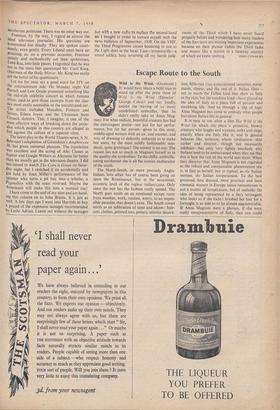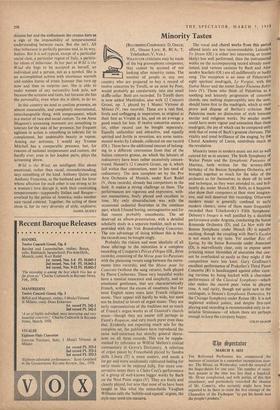Escape Route to the South
Wild is the Wind. (Gaumont.) IT would have taken a bold man to stand up after the press show of Wild is the Wind (Director : George Cukor) and say loudly, amidst the waving of so many uninhibited umbrellas, that he didn't really take to Anna Mag- nani. For what radiant, beautiful creature has had the extravagant praise—not just for her perfor- mance, but for, her person—given to this stout, middle-aged woman with an air, and manner, and way of dressing so defiantly unkempt as to make her seem, by the most mildly fashionable stan- dards, quite grotesque? The answer is no one. The reason lies not so much in Magnani herself as in the quality she symbolises. To the chilly, umbrella- toting northerner she is all the outsize exuberance of the south.
The North-South, or more precisely Anglo- Italian, love affair has of course been going on since the Renaissance, but at the occasional, eccentric level of the inglese italianizzato. Only since the war has the fashion really spread. The North goes south on an emotional escape route from weather, work, routine, worry, to an impos- sible paradise that doesn't exist. The South comes north as an infiltration of taste and idiom : hair- cuts, clothes, pointed toes, pottery, interior decora- tion, fifth-rate vino, concentrated tomatoes, nurse- maids, cheese, and the rest of it. Italian films— not so much the Fellini kind that show us Italy in the rain, but the sunshine kind—have played up the idea of Italy as a place full of passion and throbbing life. And so through a slip of logic Anna Magnani has come to embody what people feel about Italian life in general.
It is easy to see, after a film like Wild is the Wind (in which she plays a primitive, blowsy creature who laughs and screams, sulks and sings, exactly when she feels like it, and in general behaves like someone whom civilisation—that curber and director, though not necessarily inhibitpr—has only very lightly touched), why Italians tend to be embarrassed when they see that this is how the rest of the world sees them. When they discover that Anna Magnani is not regarded as the robust and unrepeatable phenomenon she is, in fact as herself, but as typical, as the Italian woman, the Italian temperament. To the best groomed, best dressed, most practical and least romantic women in Europe (since romanticism is not a matter of temperature, but of outlook) the idea' of being represented by a fiery termagant who looks as if she hadn't brushed her hair for a fortnight is so odd as to be almost unanswerable. If Anna Magnani were a phoney, if she were really unrepresentative of Italy, then one could dismiss her and the enthusiasm she creates here as a sign of the impossibility of temperamental understanding between races. But she isn't. All that behaviour is perfectly genuine and, in its way, Italian. But it is not typical, except of a particular social class, a particular region of Italy, a particu- lar idiom of behaviour. In her part in Wild is the Wind she begs to be accepted as herself, an individual and a person, not as a symbol. She is an accomplished actress with enormous warmth and sudden bursts of ironic humour that turn up now and then to surprise one. She is able to make women of any nationality look pale, not because she screams and rants, but because she has the personality, even when she is silent, to do so.
In this country we tend to confuse presence, an almost measurable, and completely international, interchangeable thing, with temperament, which is a matter of race and social custom. To me Anna Magnani's screaming moments are something to tolerate for the sake of her presence; her frequent ugliness in action is something to tolerate fdr its complement, ,her undeniable beauty in repose. Among our actresses, 1 would say Yvonne Mitchell has a comparable presence, but, for reasons of national temperament and custom, she hardly ever, even in her loudest parts, plays the screaming shrew.
Wild is the Wind, an intelligent film about emotional, rather than racial, misunderstanding, says something of the kind. Anthony Quinn and Anthony Franciosa, as the husband and the lover whose affection for each other is too strong to let a woman's love disrupt it, with their contrasting temperaments—supposedly Italian and Basque— overlaid by the patina of America, make another nice racial contrast. Together, the acting of these three is, for its very diversity of style, explosive.
ISABEL QUIOLY



































 Previous page
Previous page